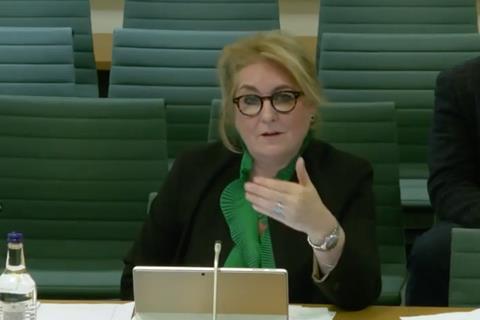In her second appearance before MPs, the lady chief justice offered a wide-ranging critique of the justice system, bemoaning curbs on sitting days and touching on digitisation, family law and diversity

Last week marked the lady chief justice’s second appearance before the Commons justice select committee. At her first, in January, she wanted the public to understand how valuable the judicial system is in societal terms. Her appearance before the new-look committee last Tuesday, she said, gave her the opportunity to speak about the current state of the justice system from the judiciary’s perspective – and she did not hold back.
First, a quick financial briefing. Baroness Carr of Walton-on-the-Hill explained that the Ministry of Justice negotiates a budget with HM Treasury. The MoJ then decides from that budget what to offer HM Courts & Tribunals Service. HMCTS advises the lady chief justice and senior president of tribunals on the ‘robustness and acceptability’ of the offer. The agreement sets out, among other things, the number of Crown court sitting days.
For the 2024/25 financial year, an offer was made in June. The judiciary agreed with then lord chancellor Alex Chalk to sit 106,000 days. His replacement, Labour’s Shabana Mahmood, added an extra 500 days.
However, the lady chief justice told the committee that the judiciary has capacity to sit 113,000 days. ‘The decision to limit us to the 106,500 has frankly had a drastic effect across the board,’ Carr declared.
Judges have had to take out of the lists cases that were ready to be heard before April – cases with judges, staff, courts, advocates, witnesses and complainants available. Listed trials, including serious violence cases against the person and RASSO (rape and serious sexual offence) cases, were coming out of fixed lists and not returning until late 2025/26 at the earliest. Salaried judges were not sitting because there were no sitting days. Fee-paid judges, who have set time aside from running their busy practices, were having their bookings cancelled.
In Taunton, only 60 sitting days are available between January and March to conduct 76 trials currently listed needing 265 days.
Carr said: ‘This is not about saving anything. It is not about saving money. You are deferring the cost and indeed you are increasing it. Why are you increasing it? You are increasing it because inflation will mean everything costs more. You are increasing it because barristers and the CPS are going to have to redo the work they had done to be ready for trial because the case will be stale. And that is not even to touch upon the acute social cost.’
Carr’s comments on sitting days dominated newspaper headlines. However, the evidence session covered other important ground.
The committee was directed to hard data on the success so far of digitisation in civil justice. With the introduction of online civil money claims, digitisation has cut from 29 to 9.2 the number of weeks to get directions on a case issued. Where digitisation is working, the efficiencies are there to be had, Carr said. However, civil digitisation has been ‘descoped’, with some courts operating an ‘utterly chaotic’ hybrid paper and digital system.
‘If it’s anything other than a money or damages claim, so for example if you want a declaration or injunction, you come out of online civil money claim. If you have more than three parties, you come out of the system. Bulk claims aren’t in there… We have to press this home, improve the understanding of those who hold the purse strings of the importance of civil to the vast majority of the population.’
In family law, Carr highlighted the success of pathfinder courts (‘we want to roll it out nationwide to every single family court’) and family drug and alcohol courts (‘transformational and revolutionary’).
On judicial diversity, Carr has been ‘working flat out’ with solicitors. This includes three ‘full-on’ sessions in the last three months with magic circle firms and working with the Law Society more generally.
Carr said: ‘What I hear from magic circle firms is, “well, our best people are so busy and making us so much money, we can’t possibly release them to do six weeks’ sitting. And I am trying to appeal to their broader social consciences to understand that, just as they can do pro bono work, so they can contribute to society in a broader way by allowing their solicitors to become members of the judiciary.’
With the session reaching the two-hour mark, committee chair Andy Slaughter MP decided Baroness Carr had been grilled long enough. The committee wants her to come back. Judging by the reaction to her comments on sitting days, so too does the legal profession.
‘Yes, please,’ the lady chief justice replied. Get that date in the diary.




































No comments yet